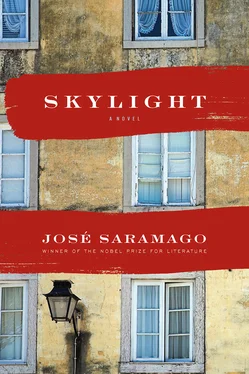Claudinha could not sleep, but it wasn’t the alleged and very real headache that prevented her from sleeping. She kept thinking about her conversation with Senhor Morais, which had not been quite as straightforward as she had given her parents to understand. She’d had no difficulty finding out what had happened between him and Lídia, but what had followed was less easy to describe. Nothing very terrible had occurred, nothing that could not or should not be told, but it was complicated. Not everything is as it seems, and not everything that seems is. Between being and seeming there is always a point of agreement, as if being and seeming were two inclined planes that converge and become one. There is a slope and the possibility of sliding down that slope, and when that happens, one reaches a point at which being and seeming meet.
Claudinha had asked her question and been given an answer, but not immediately, because Paulino had a lot of work to do and could not give her the desired explanation there and then. She had to wait for six o’clock. Her colleagues left, and she stayed. Paulino called her into his office and told her to sit in the armchair reserved for the company’s more important clients. The armchair was a well-padded affair and rather low-slung. Claudinha had not given in to the latest fashion for long skirts, and so when she sat down, her skirt rode up above her knees. The soft upholstery held her there as if she were seated on a warm lap. Paulino paced up and down the office, then perched on one corner of his desk. He was wearing a light gray suit and yellow tie, which made him look more youthful. He lit a cigarillo, and the already stuffy atmosphere grew still heavier. It would soon become suffocating. Long minutes passed before Paulino spoke. Maria Cláudia found the silence, broken only by the tick-tock of the solemn grandfather clock, increasingly awkward. Paulino, on the other hand, seemed perfectly at ease. He had already smoked half his cigarillo when he said:
“So you want to know what’s going on, do you?”
“I realize, Senhor Morais”—that is how Maria Cláudia had responded—“I realize that I probably have no right to ask, but given my friendship with Dona Lídia…”
That is what she said, as if she knew already that a quarrel was the only possible explanation for Paulino’s absence. She may have been under the influence of her mother, who could think of no other motive. Her response would have appeared foolish in the extreme if it turned out that there had been no such quarrel.
“And does your friendship with me not count?” asked Paulino. “If your only reason for coming to talk to me about the matter is your friendship for her, I’m not sure I should…”
“It was wrong of me to ask. Your personal life is none of my business. Please forgive me…”
This show of disinterest could have provided Paulino with an excuse not to explain what had happened, but Paulino had been expecting Maria Cláudia to ask and had even considered how he might respond.
“You haven’t answered my question. Is it just your friendship for her that makes you ask that question? Does the friendship you feel for me not count at all? Are you not my friend as well?”
“You’ve always been very kind to me, Senhor Morais…”
“I’m kind to the other employees too, and yet I’m not about to reveal details of my private life to them, nor do I invite them to sit in that armchair.”
Maria Cláudia said nothing. She found his remark embarrassing and bowed her head, blushing. Paulino pretended not to notice. He drew up a chair and sat down opposite Claudinha. Then he told her what had happened: the letter, the conversation with Lídia, the breakup. He omitted any episodes that might show him in an unfavorable light and presented himself with a dignity that would have been fatally compromised had he included them. When he faltered in his account of events, Maria Cláudia sensed that this was because he might well have emerged from the encounter as the less dignified of the two. However, as to the crux of the matter, there was no room for doubt once she had read the letter that Paulino showed to her:
“I’m really sorry I asked you, Senhor Morais. I realize now that I had no right to.”
“You had more right than you might think. We’re good friends, and there can be no secrets between friends.”
“But…”
“Naturally I’m not going to ask you to tell me yours. We men confide much more in women than they do in us, which is why I told you the whole story. I trust you, trust you completely.” He leaned forward, smiling. “So now we share a secret, and secrets bring people closer, don’t they?”
Maria Cláudia merely smiled, as all women do when they don’t know what to say. The person at whom the smile is directed can interpret it as he or she wishes.
“It’s good to see you smile. At my age, it’s always good to see young people smile. And you’re very young indeed.”
Another smile from Maria Cláudia. Encouraged, Paulino went on:
“And not just young, but pretty too.”
“Thank you, Senhor Morais.”
This time the smile did not come unaccompanied, and her voice quavered slightly.
“There’s no need to blush, Claudinha. I’m only saying what’s true. I don’t know anyone as pretty as you.”
In order to say something, since a smile was no longer enough, Claudinha said what she should not have said:
“Dona Lídia was much prettier than me!”
Yes, “was”! As if Lídia had died, as if she were no longer relevant to the conversation except as a point of comparison.
“Not at all. I’m speaking as a man now, and you’re quite different. You’re young and pretty and there’s something about you that I find really… touching.”
Paulino was very polite, so polite that he even said “May I?” before reaching out a hand to remove a stray hair that had fallen onto Claudinha’s shoulder. However, the hand did not follow the same trajectory on the way back. It brushed Claudinha’s face, so slowly it resembled a caress, so lingeringly it appeared not to want to move away. Claudinha sprang to her feet. Paulino’s voice, grown suddenly husky, said:
“What’s wrong, Claudinha?”
“Nothing, Senhor Morais. I have to go. It’s late.”
“But it’s not even seven o’clock yet.”
“Yes, but I have to go.”
She made as if to leave, but Paulino blocked the way. She looked at him, tremulous and frightened. He reassured her. He touched her cheek as an affectionate grandfather might do and murmured:
“Don’t be silly. I wouldn’t hurt you. I only want what’s best for you.”
Exactly what her parents used to say to her: “We only want what’s best for you.”
“Did you hear? I only want what’s best for you.”
“I have to go, Senhor Morais.”
“But you do believe what I just said, don’t you?”
“Of course I do, Senhor Morais.”
“And we’re friends?”
“Yes, Senhor Morais.”
“And we always will be?”
“I hope so, Senhor Morais.”
“Excellent!”
He stroked her cheek again, saying:
“What I told you is strictly between you and me. It’s a secret. You can tell your parents if you like, but if you do, be sure to say that I only left that woman because she proved unworthy of me. I could never leave someone I truly cared about, not without some pressing reason. It’s true that, for some time now, I haven’t felt entirely comfortable with her. I think my feelings for her were already beginning to fade. There’s someone else, someone I’ve only known for a few weeks. And I’ve found it very hard having that other person so close to me and not being able to talk to her. Do you understand, Claudinha? It was you I was thinking of!”
Читать дальше












